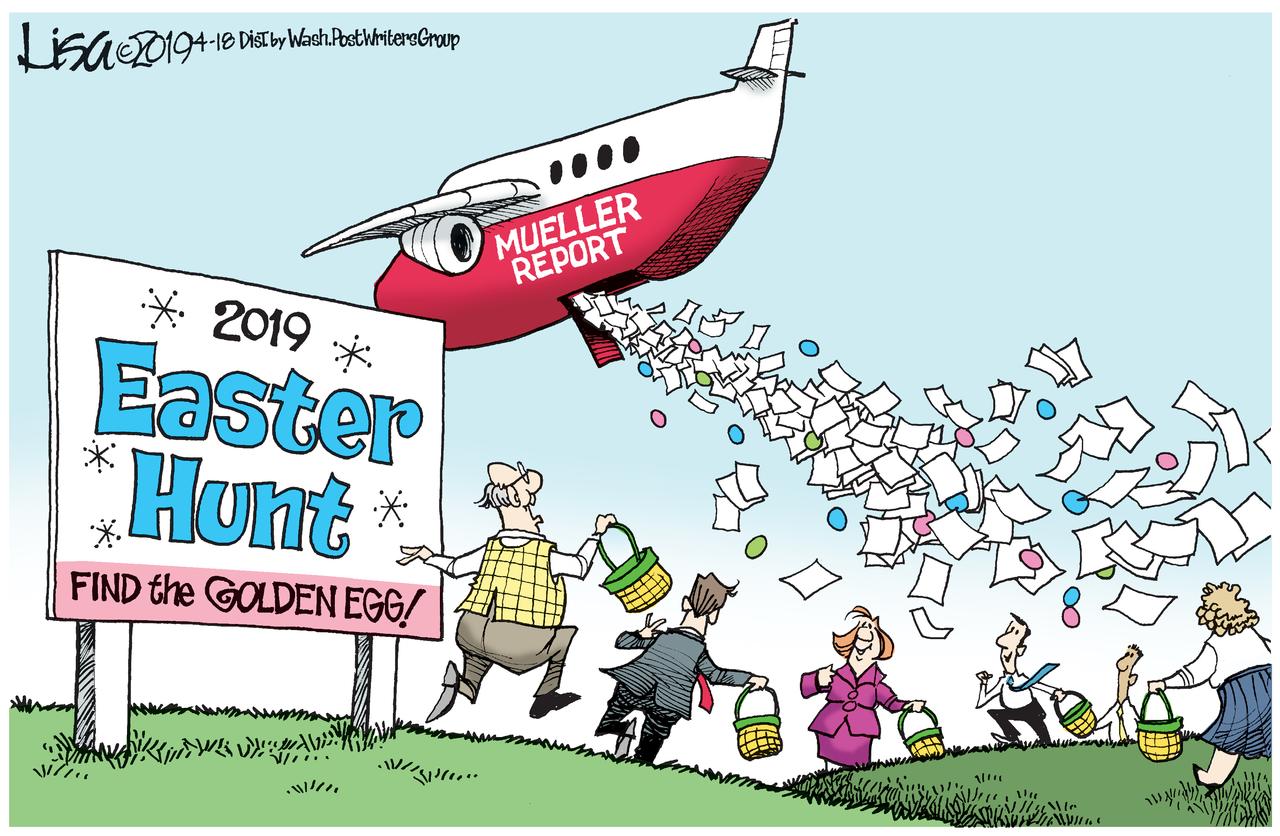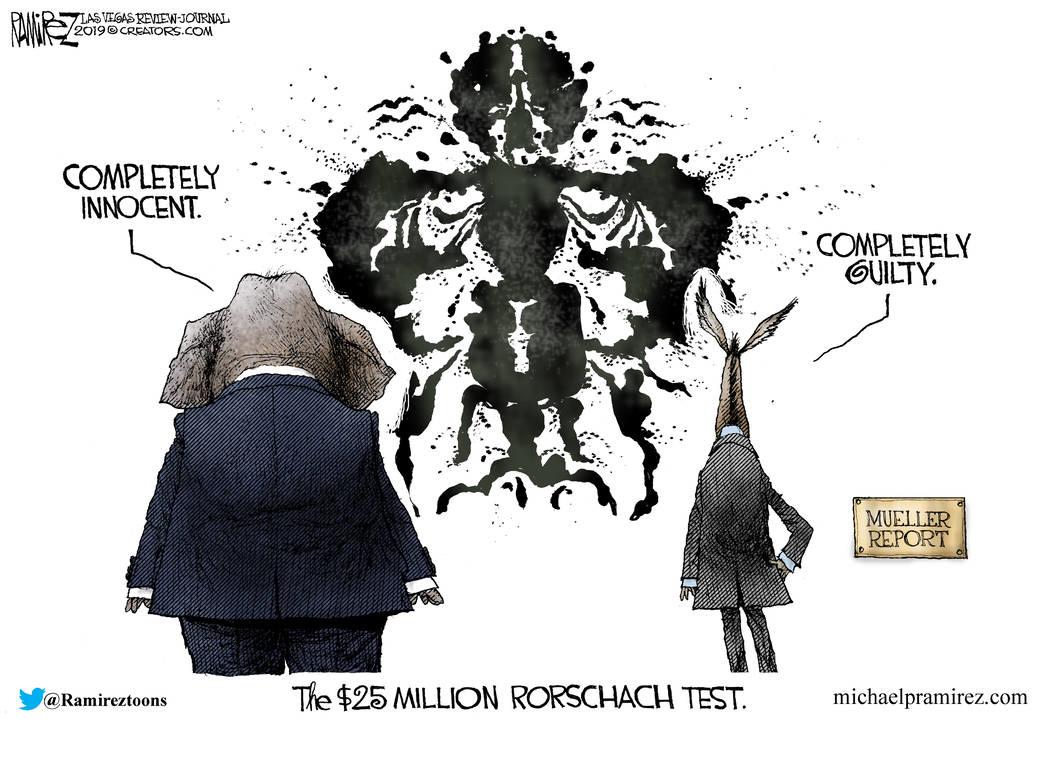After two years of near-constant abuse and allegations from a desperate left unable to come to terms with Hillary’s loss, who can blame President Trump for not letting this farce go quite yet. In a series of new tweets this morning, he unleashes more pointed snark at Mueller and his team’s lies as well as the menagerie of Mueller lackeys who are now stunned at the lack of ‘there’, there in his report…
“Statements are made about me by certain people in the Crazy Mueller Report, in itself written by 18 Angry Democrat Trump Haters, which are fabricated & totally untrue. Watch out for people that take so-called “notes,” when the notes never existed until needed.
Because I never agreed to testify, it was not necessary for me to respond to statements made in the “Report” about me, some of which are total bullshit & only given to make the other person look good (or me to look bad). This was an Illegally Started Hoax that never should have happened, a..”
Statements are made about me by certain people in the Crazy Mueller Report, in itself written by 18 Angry Democrat Trump Haters, which are fabricated & totally untrue. Watch out for people that take so-called “notes,” when the notes never existed until needed. Because I never….
— Donald J. Trump (@realDonaldTrump) April 19, 2019
…agreed to testify, it was not necessary for me to respond to statements made in the “Report” about me, some of which are total bullshit & only given to make the other person look good (or me to look bad). This was an Illegally Started Hoax that never should have happened, a…
— Donald J. Trump (@realDonaldTrump) April 19, 2019
But, as WSJ’s Kimberley Strassel writes, what’s in the special counsel’s findings is almost as revealing as what’s left out…
By the fall of 2017, it was clear that special counsel Robert Mueller, as a former director of the Federal Bureau of Investigation, was too conflicted to take a detached look at a Russia-collusion story that had become more about FBI malfeasance than about Donald Trump. The evidence of that bias now stares at us through 448 pages of his report.
President Trump has every right to feel liberated. What the report shows is that he endured a special-counsel probe that was relentlessly, at times farcically, obsessed with taking him out. What stands out is just how diligently and creatively the special counsel’s legal minds worked to implicate someone in Trump World on something Russia- or obstruction-of-justice-related. And how—even with all its overweening power and aggressive tactics—it still struck out.
Volume I of the Mueller report, which deals with collusion, spends tens of thousands of words describing trivial interactions between Trump officials and various Russians. While it doubtless wasn’t Mr. Mueller’s intention, the sheer quantity and banality of details highlights the degree to which these contacts were random, haphazard and peripheral. By the end of Volume I, the notion that the Trump campaign engaged in some grand plot with Russia is a joke.
Yet jump to the section where the Mueller team lists its “prosecution and declination” decisions with regards the Russia question. And try not to picture Mueller “pit bull” prosecutor Andrew Weissmann collapsed under mountains of federal statutes after his two-year hunt to find one that applied.
Mr. Mueller’s team mulled bringing charges “for the crime of conspiracy—either under statutes that have their own conspiracy language,” or “under the general conspiracy statute.” It debated going after them for the “defraud clause,” which “criminalizes participating in an agreement to obstruct a lawful function of the U.S. government.” It considered the crime of acting as an “agent of a foreign government”—helpfully noting that this crime does not require “willfulness.”
Up to now, the assumption was that Mr. Mueller had resurrected long-ago violations of the rarely enforced Foreign Agent Registration Act of 1938 purely to apply pressure on folks like Paul Manafort and Mike Flynn. Now we find out that it was resurrected in hopes of applying it to campaign-period actions of minor figures such as Carter Page and George Papadopoulos.
Mueller’s team even considered charging Trump associates who participated with campaign-finance violations for the June 2016 Trump Tower meeting with Russian lawyer Natalia Veselnitskaya. Was that meeting “a conspiracy to violate the foreign contributions ban”? Was it “the solicitation of an illegal foreign source contribution”? Was it the receipt of “an express or implied promise to make a [foreign source] contribution”? The team considered that the law didn’t apply only to money—it could apply to a “thing of value.” Until investigators realized it might be hard to prove the “promised documents” exceeded the “$2,000 threshold for a criminal violation.” The Mueller team even credited Democrats’ talking point that former Attorney General Jeff Sessions had committed perjury during his confirmation hearings—and devoted a section in the report to it.
As for obstruction—Volume II—Attorney General Bill Barr noted Thursday that he disagreed with “some of the special counsel’s legal theories.” Maybe he had in mind Mr. Mueller’s proposition that he was entitled to pursue obstruction questions, even though that was not part of his initial mandate from Deputy Attorney General Rod Rosenstein. Or maybe it was Mr. Mueller’s long description of what a prosecution of the sitting president might look like—even though he acknowledged its legal impossibility. Or it could be Mr. Mueller’s theory that while “fairness” dictates that someone accused of crimes get a “speedy and public trial” to “clear his name,” Mr. Trump deserves no such courtesy with regard to the 200 pages of accusations Mr. Mueller lodges against him.
That was Mr. Mueller’s James Comey moment. Remember the July 2016 press conference in which the FBI director berated Hillary Clinton even as he didn’t bring charges? It was a firing offense. Here’s Mr. Mueller engaging in the same practice—only on a more inappropriate scale. At least this time the attorney general tried to clean up the mess by declaring he would not bring obstruction charges. Mr. Barr noted Thursday that we do not engage in grand-jury proceedings and probes with the purpose of generating innuendo.
Mr. Mueller may not care. His report suggests the actual goal of the obstruction volume is impeachment: “We concluded that Congress has the authority to prohibit a President’s corrupt use of his authority.”
Note as well what isn’t in the report. It makes only passing, bland references to the genesis of so many of the accusations Mr. Mueller probed: the infamous dossier produced by opposition-research firm Fusion GPS and paid for by the Hillary Clinton campaign. How do you exonerate Mr. Page without delving into the scandalous Moscow deeds of which he was falsely accused? How do you narrate an entire section on the July 2016 Trump Tower meeting without noting that Ms. Veselnitskaya was working alongside Fusion? How do you detail every aspect of the Papadopoulos accusations while avoiding any detail of the curious and suspect ways that those accusations came back to the FBI via Australia’s Alexander Downer?
The report instead mostly reads as a lengthy defense of the FBI—of its shaky claims about how its investigation began, of its far-fetched theories, of its procedures, even of its leadership. One of the more telling sections concerns Mr. Comey’s firing. Mr. Mueller’s team finds it generally beyond the realm of possibility that the FBI director was canned for incompetence or insubordination. It treats everything the FBI or Mr. Comey did as legitimate, even as it treats everything the president did as suspect.
Strassel ends on a high note, taking aim directly at the man himself:
Mr. Mueller is an institutionalist, and many on his team were the same Justice Department attorneys who first fanned the partisan collusion claims. He was the wrong man to provide an honest assessment of the 2016 collusion dirty trick. And we’ve got a report to prove it.
But none of that will stop the desperate left from stretching out this farce through November 2020!
via ZeroHedge News http://bit.ly/2KRXywn Tyler Durden

